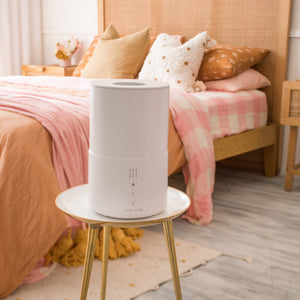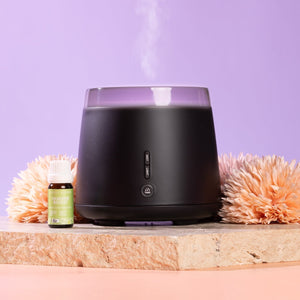How Sleep Works: Unlocking the Science of a Good Night's Rest
We all know that feeling. You wake up after a terrible night's sleep feeling groggy, sluggish, and out of sorts. It’s no secret that getting enough shut-eye is crucial for our physical and mental health, but many people don’t realize how incredibly complex the process is. Understanding how sleep works can help you make better choices to prioritize getting a better night's rest. Let’s dive into the fascinating science behind sleep.
Table Of Contents:
- What Happens When We Fall Asleep?
- The Four Stages of Sleep
- How Does the Body Know When To Sleep: Circadian Rhythms
- Why is Sleep So Important: Beyond Feeling Rested
- Conclusion
What Happens When We Fall Asleep?
As soon as you close your eyes to sleep, a cascade of changes starts to take place throughout your brain and body. Your core body temperature drops, and your brain activity starts to slow down. Heart rate and breathing also decrease. All of this leads to a natural dip in your body’s energy use. However, sleep is not a constant state of rest. Instead, throughout the night, you cycle through distinct sleep stages.

The Four Stages of Sleep
Sleep is more than just closing your eyes for 8 hours straight. A full night of sleep is made up of multiple sleep cycles. These cycles all contain four key stages of sleep: three non-rapid eye movement (NREM) stages, followed by rapid eye movement (REM) sleep.
Stage 1 (N1)
Stage 1 is a brief, transitional phase where you drift from wakefulness into sleep. This sleep stage lasts only a few minutes. Light sleep is usually how this stage is described.
Stage 2 (N2)
This is where you settle into a more stable sleep. Your heart rate and breathing slow further, and your brain waves shift in a way that indicates decreased arousal but with brief bursts of activity. Interestingly, it becomes harder to wake you up in this stage.
Stage 3 (N3)
Also known as slow-wave sleep or deep sleep, Stage 3 is characterized by extremely slow brain waves (delta waves) and a significant reduction in muscle activity. Waking up from this stage is much harder. This stage plays a critical role in physical restoration, hormone regulation, and strengthening your immune system.
Stage 4 (REM)
You finally made it to REM. This is the stage most associated with dreaming. You'll notice that during this phase, brain activity ramps up, resembling wakefulness. However, your muscles remain mostly inactive, leading to the characteristic temporary paralysis we often experience during dreams. This prevents you from physically acting them out. REM sleep is thought to be essential for learning, memory consolidation, and emotional processing.
How Does the Body Know When To Sleep: Circadian Rhythms
So, how does your body actually know when it's time for sleep? You have your internal clock, formally known as your ciriadian rhythm, to thank for this. Imagine your body operating on a roughly 24-hour cycle that governs several physiological processes, such as when you sleep and wake. This is your ciradium rhythm at work, and light is the biggest influencer on it.
Increased exposure to natural daylight during the day tells your body it's time to be active. As night approaches and daylight diminishes, the pineal gland in your brain receives signals to increase production of the sleep-regulating hormone, melatonin, which helps regulate sleep. Have you ever noticed how bright lights, like those emitted from electronic devices, make you feel more alert at night? These lights disrupt your body’s melatonin production, impacting how much you sleep. Understanding how sleep works alongside your natural ciradium rhythms underscores why limiting screen time in the evening can be so helpful for a good night’s sleep.
Why is Sleep So Important: Beyond Feeling Rested
Adequate sleep is fundamental to our overall health and well-being. A chronic lack of sleep can wreak havoc on various bodily functions and increase your susceptibility to a wide range of health problems. Beyond just feeling well-rested, here are some important reasons why you need to prioritize good sleep hygiene:
Physical Health Benefits:
- Cellular repair and growth.
- Boosting immune function.
- Hormonal balance.
- Reduced risk of cardiovascular disease, diabetes, and obesity.

Mental & Cognitive Well-being Benefits
- Improved learning and memory consolidation.
- Better emotional regulation.
- Enhanced decision-making skills.
- A reduced risk of mood disorders.
As you can see, getting quality sleep offers several health benefits. If you find you are having trouble sleeping, you may have a sleep disorder. You should consult your healthcare provider if you have any concerns.
Essential Oils to Use for Sleep
Lively Living offers Australias largest range of Certified Organic Essential Oils to support sleep. See the range of Sleep Oils Here .
Diffusing quality pure essential oils in a diffuser at night time before bed and in your wind down routine, will help you drift off to sleep faster and stay asleep longer. See Lively Living's range of diffusers that hold at least 200ml of water which is what is best suited to diffuse through out the whole night.
Conclusion
It's remarkable how sleep works behind the scenes to refresh and revitalize us. Sleep appears to be a straightforward biological process. However, when we take a closer look at the intricate stages, the role of our ciradium rhythum and the profound impact sleep has on our overall health, it's clear that sleep is a complex and vital aspect of a healthy life. Hopefully, understanding a bit more about how sleep works has empowered you to prioritize sleep and improve your overall well-being.
Yours in health and wellbeing
Lively Living Team



















